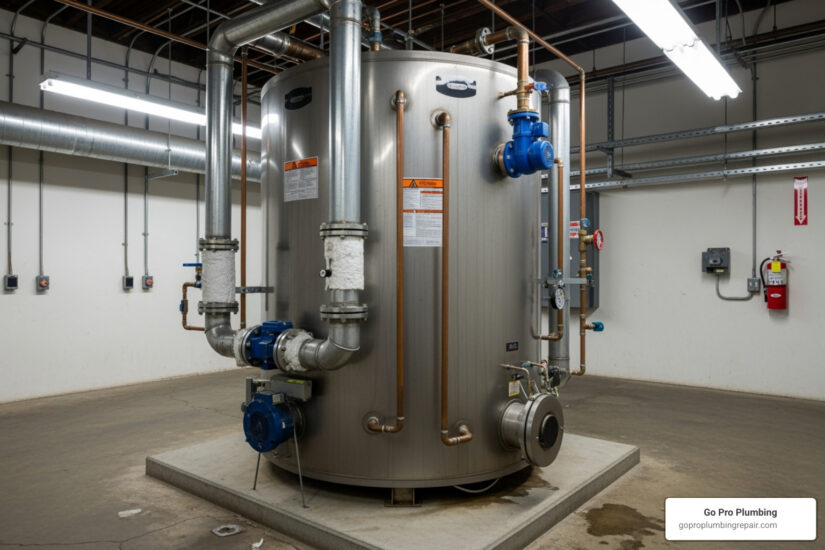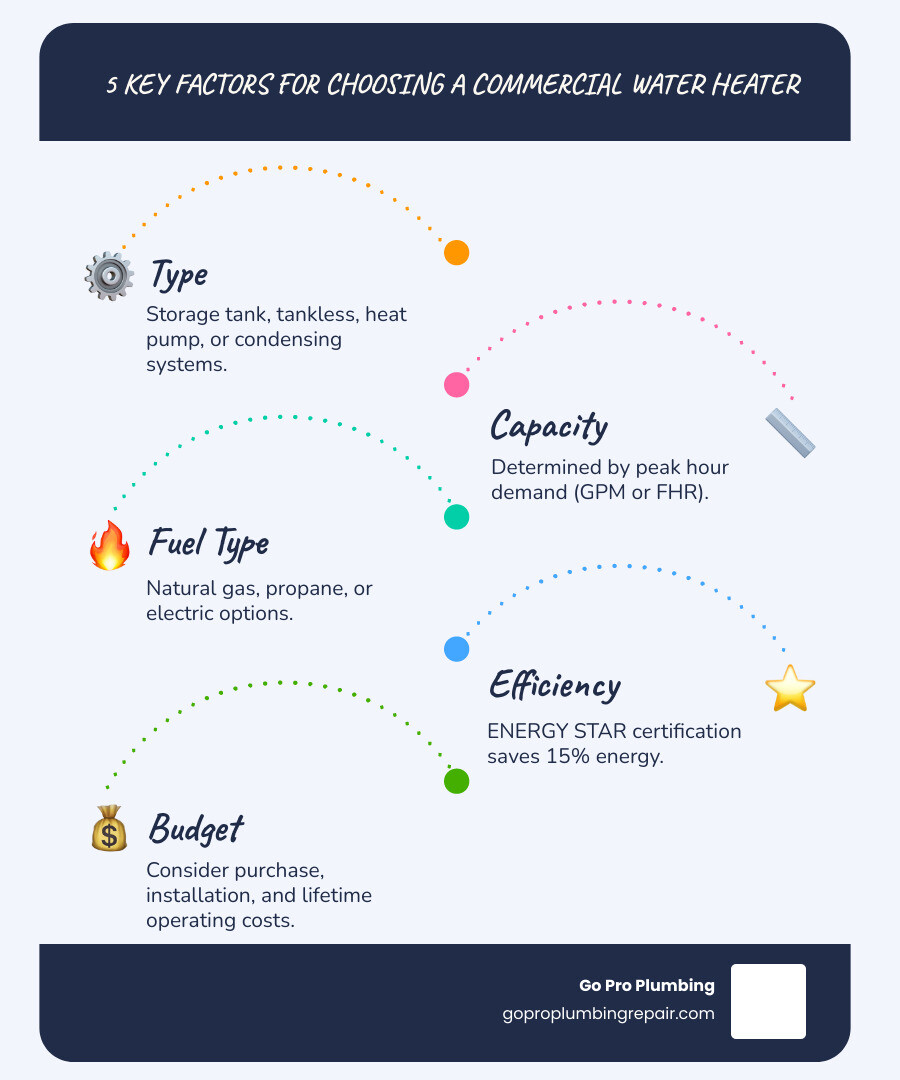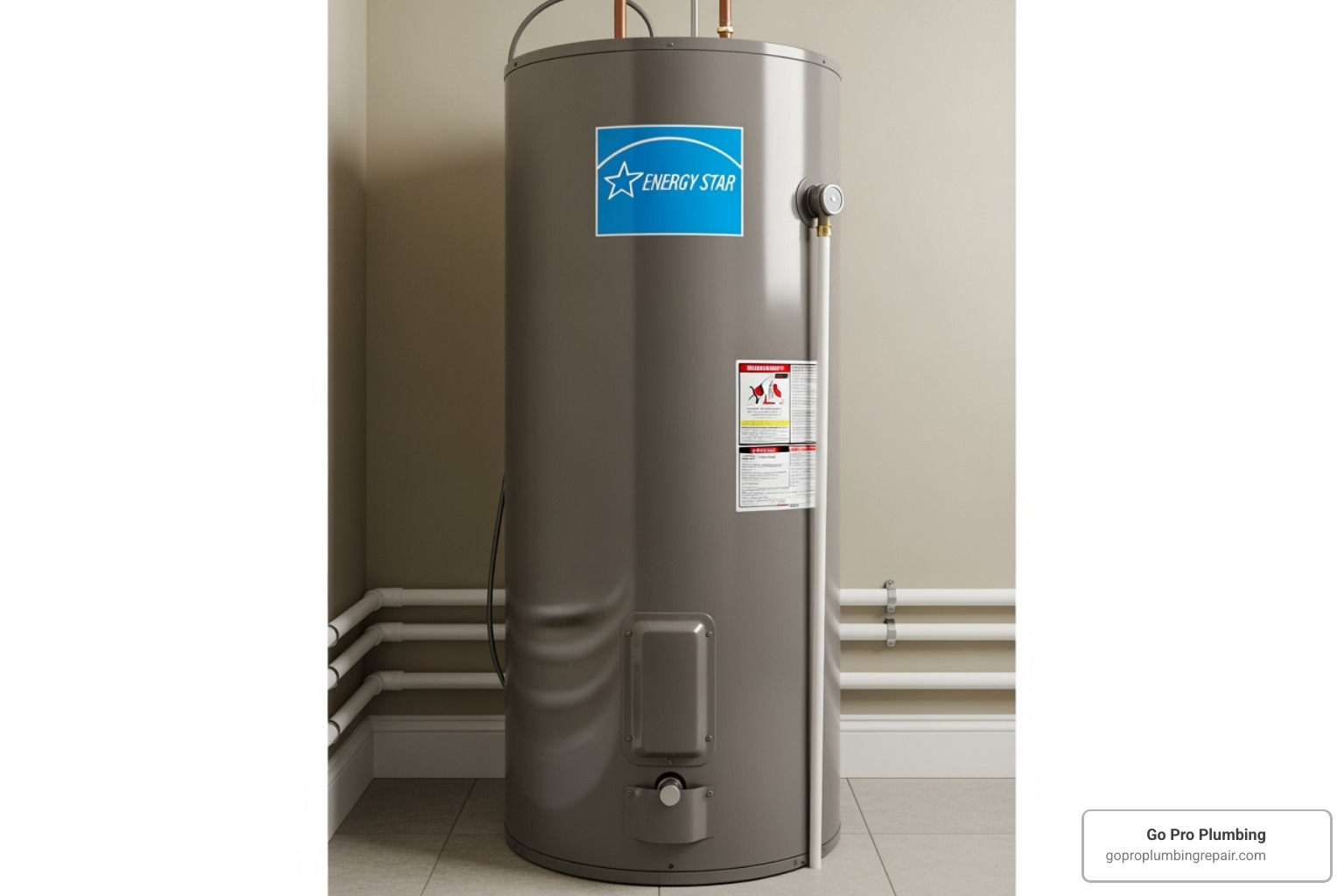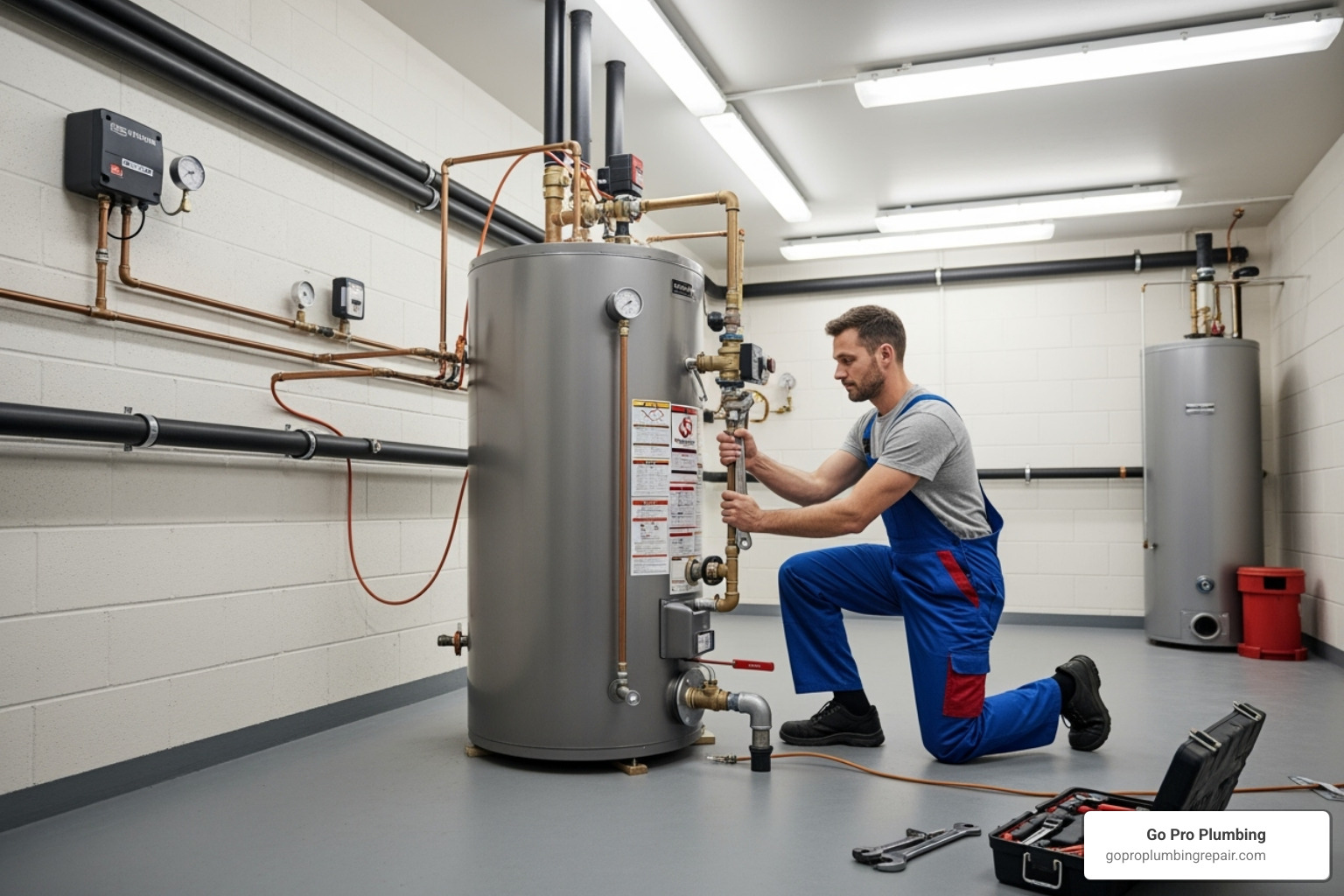Shop Smart for Commercial Water Heaters
By Brian on November 6, 2025

Why the Right Commercial Water Heater Matters for Your Business
A commercial water heater is the backbone of hot water supply for businesses like restaurants, hotels, and hospitals. Choosing the right system is crucial for ensuring smooth operations and controlling energy costs.
Quick Guide to Choosing a Commercial Water Heater:
- Type: Storage tank, tankless, heat pump, or condensing.
- Capacity: Based on peak hour demand.
- Fuel Type: Natural gas, propane, or electric.
- Efficiency: Look for ENERGY STAR certification for up to 15% energy savings.
- Budget: Consider purchase, installation, and long-term operating costs.
Without reliable hot water, a restaurant can’t wash dishes, a hotel can’t serve guests, and a hospital can’t maintain sanitation. The stakes are high.
ENERGY STAR certified commercial water heaters use about 15% less energy than standard units. For high-usage businesses, a commercial heat pump water heater can save over 10 MWh annually, which is equivalent to removing 1.5 cars from the road each year.
This guide will walk you through the types of commercial water heaters, sizing, efficiency, and key features. Whether you’re replacing an old unit or planning a new installation, you’ll learn how to make a smart investment and avoid costly mistakes.

Understanding the Types of Commercial Water Heaters
Modern commercial water heaters come in several types, each designed for different business challenges. Understanding your options is the first step to choosing the right system.
Traditional Storage Tank Heaters
These workhorses heat and store water in a large insulated tank, keeping it ready for use. They are ideal for businesses that need a large amount of hot water at once, like a laundromat or a restaurant during a rush.
- Gas-fired storage tanks (natural gas or propane) heat water quickly and are often cheaper to operate than electric models.
- Electric storage tanks are a great option when gas isn’t available. They are quieter and often easier to install but can have higher operating costs.
Tank material is important for longevity. While glass-lined steel tanks are common, advanced options like AquaPLEX® duplex stainless steel offer superior corrosion resistance without needing anode rods that require replacement.
Need help keeping your system running smoothly? Check out our guide on water heater installation and repair.
Tankless (On-Demand) Heaters
Tankless water heaters heat water instantly as you need it, rather than storing it. When a hot water tap is turned on, water flows through the unit and is rapidly heated by a gas burner or electric element.
Key advantages include:
- Endless hot water: You’ll never run out, as long as you stay within the unit’s flow rate capacity.
- Space savings: These compact units mount on the wall, freeing up valuable floor space.
- Energy efficiency: By only heating water on demand, you eliminate the standby heat loss of a tank, leading to lower utility bills.
For very high demand, you can manifold multiple tankless units together. This provides a powerful, redundant system—if one unit needs service, the others keep running, preventing business shutdowns.

Want to know just how efficient these systems can be? Take a look: Are Tankless Water Heaters More Efficient?
High-Efficiency Heat Pump (Hybrid) Heaters
Heat pump water heaters are incredibly energy-efficient. Instead of generating heat, they move heat from the surrounding air and transfer it to the water, much like a refrigerator working in reverse. This process uses significantly less electricity.
An ENERGY STAR certified commercial heat pump water heater can use less than half the energy of a standard electric model, with studies showing energy savings of over 50%. As a bonus, they also cool and dehumidify the space they occupy. For businesses using over 600 gallons of hot water daily, a heat pump unit can pay for itself in just a few years.
The Electric Power Research Institute has done extensive research on how these systems perform in real-world settings: Field performance study on heat pump water heaters. Learn more about making the switch: Energy Efficient Water Heater.
Condensing & Other High-Output Heaters
For businesses needing massive hot water capacity with maximum efficiency, condensing heaters are a top choice.
Condensing technology captures extra heat from exhaust gases that would normally be wasted. This process recycles energy to pre-heat incoming water, pushing thermal efficiency to 90% or higher. This means lower gas bills and a smaller environmental footprint. However, this process creates acidic condensate that requires a proper drainage line and specialized power-venting systems.
For the largest facilities like hospitals or schools, high BTU models offer incredible capacity, with some engineered-to-order systems delivering up to 1 million BTUs. These are custom-designed to meet exact specifications.
If you’re considering gas-fired systems, this resource will help: Natural Gas Hot Water Tank.
Key Factors for Choosing Your Commercial Water Heater
Selecting the right commercial water heater requires evaluating several key factors to ensure a reliable, efficient, and cost-effective hot water supply.
Sizing and Capacity: Meeting Your Demand
Proper sizing is the most critical factor. The goal is to meet your business’s peak hour demand—the maximum amount of hot water used in a single busy hour.
- For tankless systems, this is measured in Gallons Per Minute (GPM).
- For storage tank heaters, it’s the First Hour Rating (FHR), which combines stored water with the unit’s reheating speed.
While manufacturers offer online sizing tools, these are just general guidelines. An expert consultation is invaluable for assessing your unique operational needs, from a brewery’s cleaning cycles to a hotel’s morning shower rush. Don’t guess on sizing; let a professional guide you to the perfect fit.
If you’re in Sacramento, CA, and need help determining the right size, our team is ready to assist: Water Heater Specialist Sacramento, CA.
Fuel Type and Availability
Your water heater’s fuel type directly impacts operating costs and installation requirements.
- Natural gas is often the most cost-effective option, providing powerful heating and quick recovery for high-demand businesses.
- Propane is a solid alternative where natural gas isn’t available, though it requires on-site storage tanks.
- Electricity is common where gas isn’t an option. While traditional electric heaters can be costly to run, electric heat pump models are exceptionally efficient.
Compare local utility rates and consider your existing infrastructure (gas lines, electrical panel capacity) to determine the most economical choice. Some advanced systems can even integrate with alternative energy sources like solar or boiler water.
For any questions about gas line installations or repairs for your commercial property, we’ve got you covered: Commercial Gas Line Installation Sacramento, CA.
Energy Efficiency and Long-Term Savings
An energy-efficient commercial water heater is a smart investment that lowers your operating costs.

The ENERGY STAR certification is your best indicator of efficiency. Certified commercial water heaters use about 15 percent less energy than standard models, translating directly into lower utility bills. Over the unit’s lifespan, these savings can easily offset a higher initial purchase price.
When comparing models, look for a high Uniform Energy Factor (UEF) or thermal efficiency rating. Also, check for local utility rebates for installing high-efficiency units, which can significantly reduce your upfront cost.
To explore more ways to save on your energy bills, check out our insights on Water Heater Energy Savings.
Key Features to Look For
Beyond the basics, certain features improve performance, durability, and convenience.
- Warranty: Look for a robust commercial warranty for both the tank and parts.
- Tank Materials: Advanced materials like duplex stainless steel (e.g., AquaPLEX®) offer superior corrosion resistance and longevity compared to standard glass-lined steel.
- Smart Technology: Features like remote monitoring and diagnostics via a smartphone app can help you proactively manage your system and prevent downtime.
- Safety Features: Leak detection with automatic shut-off can prevent catastrophic water damage, while digital displays simplify troubleshooting.
These features are practical upgrades that contribute to the reliability and safety of your hot water system.
For solutions to common water heater issues, visit: Common Water Heater Problems and Solutions.
Typical Costs of a Commercial Water Heater
Budgeting for a commercial water heater means looking beyond the sticker price to the total cost of ownership.
- Purchase Price: Varies widely by type, capacity, and brand.
- Installation Costs: Can be substantial, involving plumbing, electrical, venting, and gas line work to meet code.
- Operating Expenses: Your ongoing utility bills for heating water.
A lifetime cost analysis is the smartest approach. A cheaper unit upfront may cost far more in energy and maintenance over its 10-15 year lifespan. Factors influencing total cost include the water heater type, capacity, fuel type, brand, features, and installation complexity. Don’t let a high initial price deter you from a more efficient model that offers significant long-term savings.
Learn more about managing your investment: Water Heater Financing Guide.
Installation, Maintenance, and Ensuring Reliability
You’ve chosen the perfect commercial water heater for your business. Now comes the part that truly determines whether your investment pays off: proper installation and ongoing care. Think of it this way – even the most advanced water heater won’t perform reliably if it’s installed incorrectly or neglected. Let’s walk through what it takes to keep your hot water flowing smoothly for years to come.
Professional Installation Considerations
Here’s the truth: installing a commercial water heater is complex work that demands expertise. This isn’t a weekend project or something to hand off to just anyone. These systems are powerful, potentially dangerous if installed incorrectly, and subject to strict regulations.
Venting requirements are particularly critical, especially for gas-fired and condensing units. Unlike residential systems, commercial water heaters often require power-venting systems with fans to expel combustion gases safely. A mistake here can lead to carbon monoxide buildup – a serious safety hazard. Condensing units have even more specific needs, with venting that must be sloped toward the water heater to prevent freezing and exhaust caps that stay clear of obstructions.
The gas and electrical lines feeding your water heater must be sized correctly and installed to code. Inadequate gas pressure can hamper combustion efficiency, while improper electrical connections can cause system failures or even fires. Professional installers know how to assess your existing infrastructure and make the necessary upgrades.
Local building codes aren’t suggestions – they’re requirements. In Northern California, where we operate, these codes are comprehensive and strictly enforced. Our team at Go Pro Plumbing stays current on all local and state regulations, ensuring every installation passes inspection the first time.
Safety compliance covers everything from properly installed pressure relief valves and temperature controls to maintaining correct clearances around the unit. Commercial installations often involve integration with recirculation pumps, building management systems, or existing plumbing infrastructure. Getting these connections right requires experience and knowledge.

When you work with professionals, you’re not just paying for labor – you’re investing in peace of mind. For expert installation services in Sacramento, CA, our team is ready to help: Commercial Plumbing Services in Sacramento, CA.
Essential Maintenance for Longevity
If installation is the foundation, maintenance is what keeps your commercial water heater running strong year after year. Regular care isn’t just about preventing breakdowns – it’s about protecting your investment and keeping those energy bills from creeping up.
Regular flushing might sound simple, but it makes a huge difference. Sediment gradually accumulates at the bottom of storage tanks, acting like an insulating blanket between the heat source and the water. This forces your heater to work harder, wasting energy and shortening its lifespan. An annual flush removes this buildup and restores efficiency.
For glass-lined tanks, the anode rod is your tank’s silent protector. This rod slowly corrodes instead of the tank itself, sacrificing itself to prevent leaks. Depending on your water quality, it should be inspected and replaced every few years. The good news? If you have a unit with AquaPLEX® duplex stainless steel construction, you can skip this step entirely – these advanced tanks don’t need anode rods.
The pressure relief valve is a critical safety device that prevents dangerous pressure buildup inside the tank. Testing it annually ensures it will function correctly if needed. This simple check could prevent a catastrophic failure.
Tankless units require their own special attention. In areas with hard water, mineral deposits can accumulate in the heat exchanger, reducing efficiency and potentially causing damage. Regular descaling – essentially flushing the system with a vinegar solution – keeps these units performing at their best.
The smartest approach? Enroll in a professional maintenance plan. Our skilled technicians can spot potential issues before they become expensive problems, perform necessary adjustments, and ensure your system maintains peak performance and efficiency. Annual maintenance isn’t just recommended – it’s essential for commercial applications where downtime costs money.
To learn more about keeping your system in top shape, visit our Water Heater Maintenance Service page.
Strategies for a Reliable Hot Water Supply
In the commercial world, running out of hot water isn’t just frustrating – it can shut down operations and send customers elsewhere. A restaurant can’t wash dishes. A hotel can’t serve guests. A hospital can’t maintain sanitation. The stakes are high, which is why smart businesses plan for reliability from day one.
System redundancy is your first line of defense. Instead of relying on one large water heater, consider installing two smaller units. If one fails, you still have hot water while repairs are made. Yes, the upfront cost is higher, but compare that to the cost of closing your business for a day or two.
Manifolding tankless units offers both capacity and redundancy. Restaurant we mentioned earlier? They replaced a single 150-gallon storage tank with three tankless water heaters working together. Not only did they gain endless hot water capacity, but if one unit needs service, the other two keep the kitchen running. That’s smart planning.
Don’t wait for your water heater to die before replacing it. Scheduled replacement based on the unit’s age and condition prevents emergency situations. Commercial water heaters typically last 8 to 15 years depending on type and maintenance. Planning ahead means you control the timing instead of having it forced on you at the worst possible moment.
Even with the best planning, emergencies happen. That’s where an emergency service plan with a reliable plumbing company becomes invaluable. At Go Pro Plumbing, we understand that commercial plumbing emergencies can’t wait. Our team in Northern California, including Sacramento and Rancho Cordova, provides same-day service when you need it most.
For large facilities, a hot water recirculation system ensures instant hot water at every tap, eliminating wait times and reducing water waste. This not only improves efficiency but also improves the experience for employees and customers.
These strategies work together to create a reliable hot water supply that keeps your business running smoothly. When issues do arise, we’re here to help: Commercial Plumbing Emergencies.
Frequently Asked Questions about Commercial Water Heaters
Here are answers to some of the most common questions we receive about commercial water heaters.
How does a tankless water heater compare to a tank for commercial use?
Both systems have their place, and the best choice depends on your business’s hot water usage patterns.
-
Tankless Heaters are ideal for businesses needing a continuous, endless supply of hot water. They save significant space, are highly energy-efficient since they don’t have standby heat loss, and can be manifolded for redundancy. They typically have a higher initial cost but a longer lifespan (15-20 years).
-
Storage Tank Heaters excel at meeting sudden, large demands for hot water, like filling multiple sinks at once. They have a lower initial cost and simpler technology. Their lifespan is typically 8-12 years, and they require regular maintenance like flushing.
The bottom line: If your business has intermittent but high-volume needs, a tank may be more cost-effective. If you need a constant supply, have limited space, or prioritize efficiency and redundancy, a tankless system is often the superior choice.
What are the main benefits of an ENERGY STAR certified commercial water heater?
Choosing an ENERGY STAR certified commercial water heater offers three key advantages:
- Lower Utility Bills: They use about 15% less energy than standard models (and over 50% less for heat pump models), leading to significant long-term cost savings.
- Environmental Benefits: Reduced energy consumption means a smaller carbon footprint for your business.
- Potential Rebates: Many utility companies offer financial incentives or tax credits for installing certified high-efficiency equipment, lowering your upfront cost.
These units often feature advanced technology, making them a smart investment in performance and reliability. To learn more about maximizing your savings, check out our guide on Water Heater Energy Savings.
How do I know what size commercial water heater my business needs?
Correct sizing is crucial to avoid hot water shortages or wasted energy. The calculation is based on your peak hour demand—the busiest hour of hot water use in your operation.
- For storage tanks, the key metric is the First Hour Rating (FHR).
- For tankless units, it’s Gallons Per Minute (GPM).
While online sizing tools exist, they can’t account for the specific needs of a commercial operation. Consulting a professional is essential. An expert can accurately assess your needs, factoring in your industry, fixture types, and future growth. Improper sizing is a costly mistake. An undersized unit causes operational shutdowns, while an oversized unit wastes energy and money. Don’t leave it to chance.
Our team at Go Pro Plumbing specializes in this kind of assessment. If you’re in Sacramento, CA, we’d be happy to help: Water Heater Specialist Sacramento, CA.
Conclusion
Choosing the right commercial water heater is a critical decision for your business. By understanding the differences between storage tank, tankless, heat pump, and condensing models, you can select a system that fits your demand, budget, and efficiency goals.
Remember to consider your peak hour demand, local fuel costs, and the long-term savings of an energy-efficient unit. However, even the best hardware is only as good as its installation and maintenance. Professional setup is essential for safety and performance, while routine care ensures longevity and reliability.
Your hot water system is a vital part of your daily operations. A smart choice today prevents headaches and saves money for years to come.
For expert advice and professional Commercial Plumbing Repair in Northern California, the team at Go Pro Plumbing is here to help. We understand commercial water heaters inside and out and are committed to finding the perfect, reliable solution for your business.
Ready to upgrade your hot water system or need help with your current setup? Contact us for all your family plumbing needs in Northern California. Let’s ensure your business has the efficient hot water it deserves.
